Settling In
or, Niigaanii Asemaa
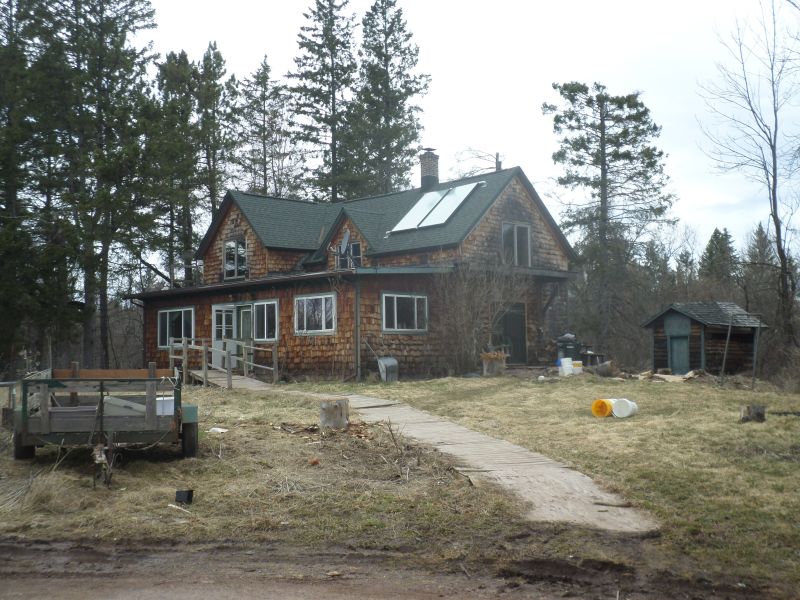
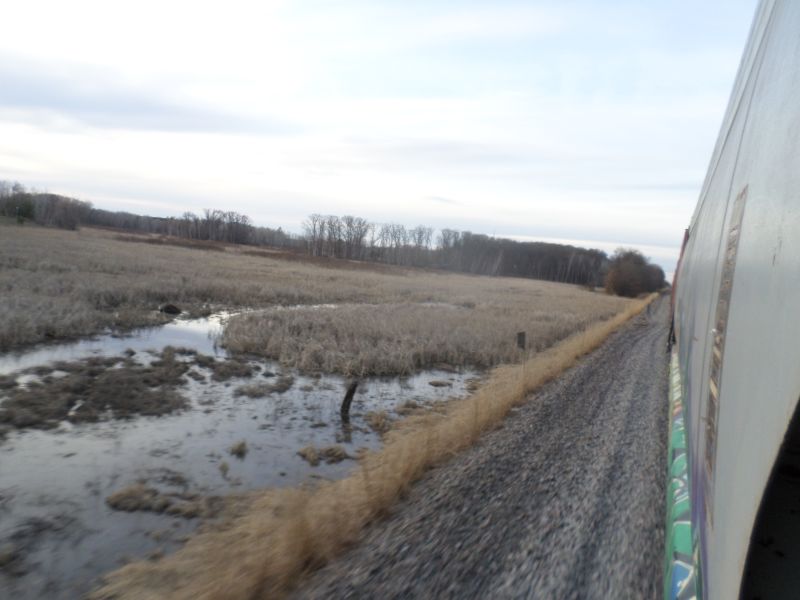
Evening freight to Superior.
Here at the cedar-shake country house I’m living in, I’m surrounded, whenever I go out, by the changing season. I arrived here after most of the snow was already gone, but along the road there were still patches, which have melted now. On my way up here from Minneapolis, I could hear, toward the beginning of the ride, spring peepers even over the clattering of the grain car that I rode to Superior, Wisconsin, but when I got to Ashland no one had heard them yet. Now two weeks later, when I arrive back home from the eight-mile bike ride to town, I can find the right driveway by echolocating, thanks to the raucous crowd of peepers in the marshy spot next to it.
These spring peepers!
You’d think the whole universe
Was dark and frogsong!
The white-throated sparrows came back north a few days ago, and their whistling “Oh, dear Canada Canada Canada” (well, we’re not too far) counterpoints the occasional grouse drumming, a bass so deep you feel it more than hear it, coming from the dozen or so acres of dense forest out back. The creek, which was a dry bed when I first saw it last summer, is crashing down toward the Big Water apace. But so far for weather we’ve had a few genuinely wonderful days leavening mostly cold, drizzly weeks.
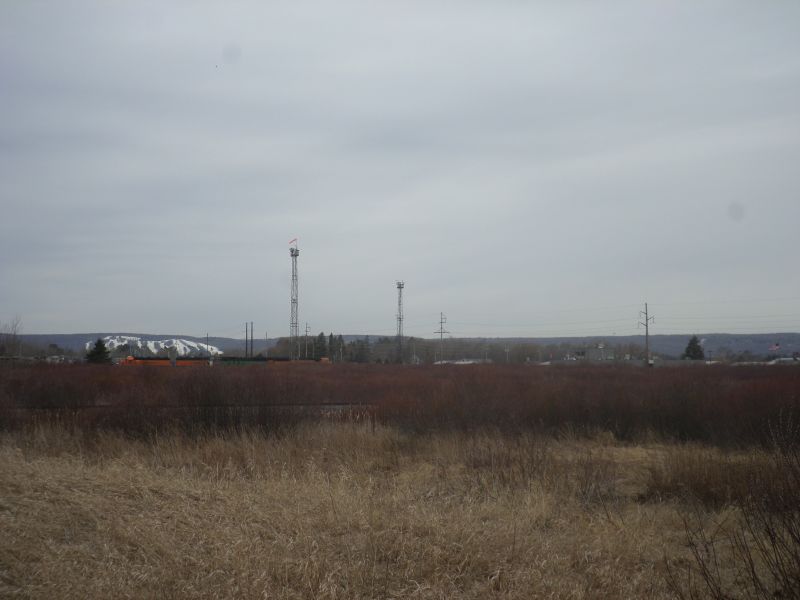
Snow still clings to the hills of Duluth in mid-April, across the river from the Superior switchyard.
As the land is in a transitional time, so, it seems, am I. I moved a carload of my things into this house a couple weeks ago and slept here a night before returning the car I’d borrowed to Minneapolis. In that night I was frustrated to realize something that would have been obvious if I’d given it any thought at all: just moving a bunch of my stuff into a house doesn’t make that house feel like home. There’s a lot more I have to do.
I’ve started by rekindling, solidifying, and building my friendships here. There’s a cohort of us in this area that we’ve unsuccessfully tried to name: post–Northland College or non-Northland, possibly homestead-aspiring, land-oriented, youngish adults. Several of us work for farms, and most of the rest of us have at some point. Most of us live on small budgets. I’ve hung out with these folks a lot the last couple weeks, at a late-running sugarbush, at a drum jam, at a work day for fixing up a cabin that one friend bought cheap, on a hike to a local overlook called St Peter’s Dome. We PNC/NNPHALOYAs (pronounced “pinken faloyas”?) like to get together and hang out, and it’s been good for settling me in.
But then in the ample time I have when I’m not hanging out, I’ve had to figure out what to do with myself. I don’t have a job yet, and might not for a while because of a summer full of inconveniently-staggered travel plans, so I’ve been having to learn how to be self-directed when I have no pressure on me of virtually any kind.
That’s a dangerous situation for me, especially if I have a computer and internet access; one of the many reasons I’ll never get a smartphone is that I know too well my tendency to fill unfilled time by dinking around pointlessly on the internet. But I’m gradually rediscovering my reserves of willpower. The best days are the ones where I don’t open the computer at all, nor any books, which can too easily serve the same purpose of giving me something to get lost in, and instead I go do something. So far the things I’ve found to do have been small: cleaning off some bones I salvaged from a deer that was found near sugarbush back in Minnesota; patching up all my ratty nomad gear; exploring the woods behind the house. I’m laying groundwork, here; I’m getting myself situated. I’m starting to catch glimpses of my ability to do big things, by doing small things.
Interestingly, I’ve found that a decent barometer of how good a day it’s going to be is how soon I remember to offer tobacco. This is an Ojibwe tradition, and I’ve made it a habit of my own since I got more serious about learning about Ojibwe culture. It’s simple enough: you take a pinch of tobacco in your left hand—the hand closer to your heart—and put it down by the east side of a tree, or in the water, or in a fire.
“I don’t wish to denigrate the traditions of Native Americans,” you might say, “but that sounds totally pointless.” But there’s more to it than a pleasant and inefficient way to get rid of pipe tobacco. When you go out to that tree, or that water, or fire, you are, perforce, paying attention to the nonhuman world. Even that is not such a common thing to do in this era that allows us to live years, if we choose, experiencing the outdoors only when moving between the door of a building and the door of a car. But it’s just a starting point; once I’m paying attention to the nonhuman world, I start to find that, to get the most out of it, I have to shift into a different kind of thinking. I find it very easy to get caught up in the uniquely human way of thinking, the world of words and symbols, where everything is sequential, nameable, and empirically describable. But when I go to offer tobacco next to a tree, I remember to step out of that mode and speak to the tree.
Doing that, of course, I’m reminded that the tree doesn’t communicate in words, not even Ojibwe ones; it communicates in the language of doing and being, like all of nature does. The tree’s interaction with me starts with it synthesizing oxygen and possibly fruit or nuts that I use, and I return the favor by remembering that I am part of nature. I can give back to a tree in material ways, by weeding around it or pruning its dead branches, or more commonly by simply giving it nitrogen, of which urine is a good source—but in the moment I’m offering tobacco, what I’m doing is continuing the process of making my mind into one that will think to do those things, and will do them well.
A conversation, in whatever small way, changes one’s mind, but in the moment I drop those shreds of leaf, I’m not changing the tree so much as I’m changing myself—really, when we get down to it, the only being I have the power to change. And following John Muir’s famous dictum, “When we try to pick out anything by itself, we find it hitched to everything else in the Universe,” when I change myself I don’t change only myself, I change the world around me by being the kind of person I change myself into, and the tree is part of that world.
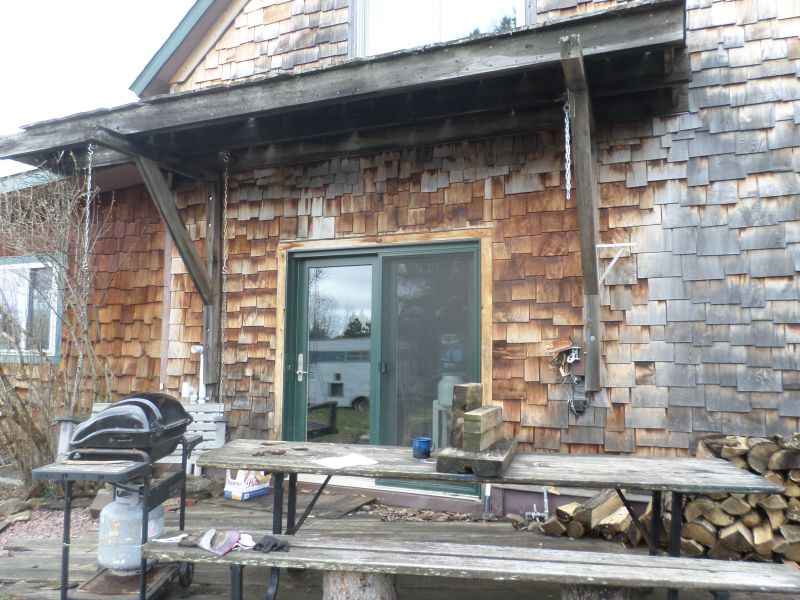
So it’s possible to make sense of this gesture in purely materialistic terms, but that’s not how I think of it when I’m doing it, or at least not exclusively how. Because it’s originally a spiritual practice, and when I do it I find that there’s something that feels like it’s telling me it understands the message, something we can go ahead and call spiritual. Call it the emergent properties of the arrangement of the forest in an ecosystem, or call it the patterns of relating to the Earth inborn in me from the few billion years of heritage I have that dealt with the rest of the biosphere very closely. Or don’t try to call it anything, and just let it be; that’s how I find I learn the most, because how can I learn from something if I’ve already decided I know just what it is? I’m sitting next to a cat who lives here. As I write in my notebook at the picnic table, Mimsy is intently watching everything around us, the waving bushes, the still grass, my hand. She’s seen all this stuff practically every day of her life, but she still watches as though her life depended on it. And she is always learning. If we could communicate better, what a tour of this place she could give me! Even with our language barrier, I learned a bit from her today, when she rode on my shoulders across the little footbridge over the creek and then climbed down and explored the less-familiar woods across the water from her usual territory, with every muscle poised, noticing every motion.
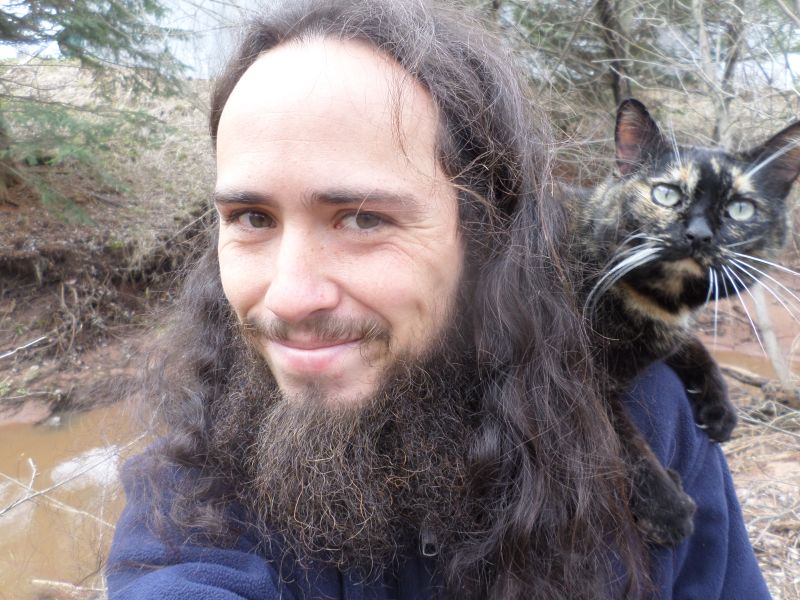
Riding on shoulders is Mimsy’s favorite thing.
So even though I’ve found myself lonely at this house fairly often, maybe it’s for the better. If I lived in town, I could pop on down to the coffee shop and spend a few bucks to wait for a chance encounter with a friend, as always happens at the Black Cat. But out here, I’ve made a discovery about loneliness: it isn’t the same as aloneness. Loneliness seems to equal aloneness plus the feeling that everything you do is pointless. If you think everything you do is pointless, moreover, you’ll end up doing only things that really are pointless. But if you go out and offer that tobacco, or do whatever else it is that you need to do to remember what you’re hitched to, you’ll find the things you do changing, gravitating toward a point after all.
Which is what I’m trying to do with life as a whole—work my way into a raison d’être by re-membering my invisible roots that are joined to everything in the Universe. If it takes a little loneliness to make me do that, I’m okay with it. Only by getting challenged do we ever grow, and despite all the physical hard times and trials I’ve sailed through while traveling for over three years of my life—the nights in a wet tent, the heart-pounding cat-and-mouse in switchyards—it turns out loneliness feels like a bigger challenge than I’ve faced in a long time. And accordingly, I can feel that I’m growing more because of it, back into where I’ve always been.
File under: angst, Anishinaabe, moving, photos, poetry, trains
Note: comments are temporarily disabled because Google’s spam-blocking software cannot withstand spammers’ resolve.
2 Comments
Cartwheel
HistoryChunky chuck! Thank you. I really love the act of offering thanks, with or without tobacco. I so appreciate you doing that. It’s always a bit of extra specialness. “If you think everything you do is pointless, moreover, you’ll end up doing only things that really are pointless”…. damn I must agree. Someone once said that it’s not that we are afraid of meaninglessness it’s that we are afraid of meaning, that what we do actually matters. Some Earthsea vibes from that.
Gabe
HistoryChuck, thanks for sharing! That was inspiring. There’s a Buddhist phrase: “the better way to live alone.” I don’t know the rest, but to me it invites a certain mystery that we can touch when we pass through our definitions of what it means to be alone.